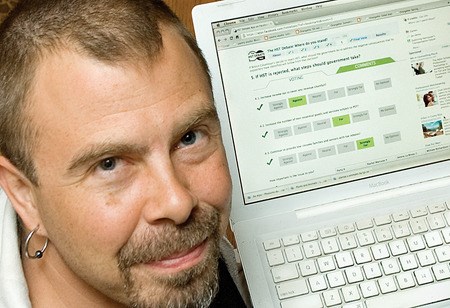Not sure where you stand on the HST? Theres an app for that.
A new, non-partisan group called PartyX (PartyX.com) has released a Facebook app designed to help voters figure out whether they support the controversial tax, currently the subject of a mail-in referendum.
Facebook users can access the free app at Apps.Facebook.com/HSTDebate to view a quick primer on the impact of the HST on households, businesses, jobs and the economy provided by the Fight HST campaign and the pro-HST Smart Tax Alliance.
Users then answer multiple choice questions to determine their stance on whether the province should keep the HST or scrap the tax and return to the old PST/GST system, and how they would likely vote in the referendum. They can also compare their answers to friends and other Facebook users and, depending on individual privacy settings, comment on specific questions and post results to their profiles or share with friends.
PartyX founder John Richardson says the app is an experiment to see how social media can be used to drive social change and become a tool for democratic decision-making, which he sees as a necessary step in the future of democracy.
Using the Internet as a portal to new forms of participatory democracy is the way to go, we think he says.
Richardson, the founder of PIVOT Legal Society, left the organization two months ago to form PartyX with Free Geek and Vancouver Indymedia co-founder Scott Nelson and a crew of other socially conscious programmers, open-source advocates and social media experts.
With rumblings of a fall provincial election, Richardson says the HST app is the first step in a broader social media campaign geared to engage the electorate around collective decision-making on the Internet. What were doing right now is testing out some of the voting technology and testing out Facebook as an interface how do people react to using Facebook as a political [entity], he says.
In the long term, PartyX hopes to develop apps and online initiatives that can help affect real change within a democratic system that has left many voters feeling disenfranchised and frustrated. Richardson says the groups HST app differs from the kinds of social media campaigns that abounded during the federal election, such as ShitHarperDid, which gained publicity, but appears to have made little impact on voter turnout or the results of the election.
During the federal election we saw the Internet being used as a communications tool, an organizing tool, but it wasnt a collective decision-making tool. It wasnt an alternative to the current models of governance we have... I think in the long term were going to have to be seriously looking at those types of options because our current model of democracy is not faring that well.
If Internet users start weighing in on election issues in large numbers online, it may catch the attention of politicians and policy-makers, he says, adding the advantage of using Facebook is that it tracks unique users, preventing people from voting multiple times.
Richardson says PartyX also hopes its technology could be used internationally in developing democracies, noting the group has already been approached by a non-profit working in Egypt and Tunisia. Developing democracies may even have an advantage over countries like Canada when it comes to taking advantage of the Internet as a democratic tool. If the processes are there, why would they bother adopting what we have in terms of parliamentary democracy with all its creaks and groans, why wouldnt they just leapfrog us?
But even with our creaks and groans Richardson says he has faith bringing people together online will eventually exert a real-world influence over politics-as-usual in this country. Its an open question for me to see how flexible open current systems are going to be to new ways of making decisions. But what I do know is when people get together and make decisions together collectively, thats power, and politics orients itself around that type of thing.
Mail-in ballots for the HST should be arriving at households throughout B.C. as soon as Canada Post service is resumed. Voters have until July 22 to return their ballots. If the HST is rejected (a yes vote on the referendum question) Premier Christy Clark has said the province will revert to the GST/PST split. If the HST is upheld (a no vote) Clark has said she will reduce the HST from 12 per cent to 10 percent by 2014.



